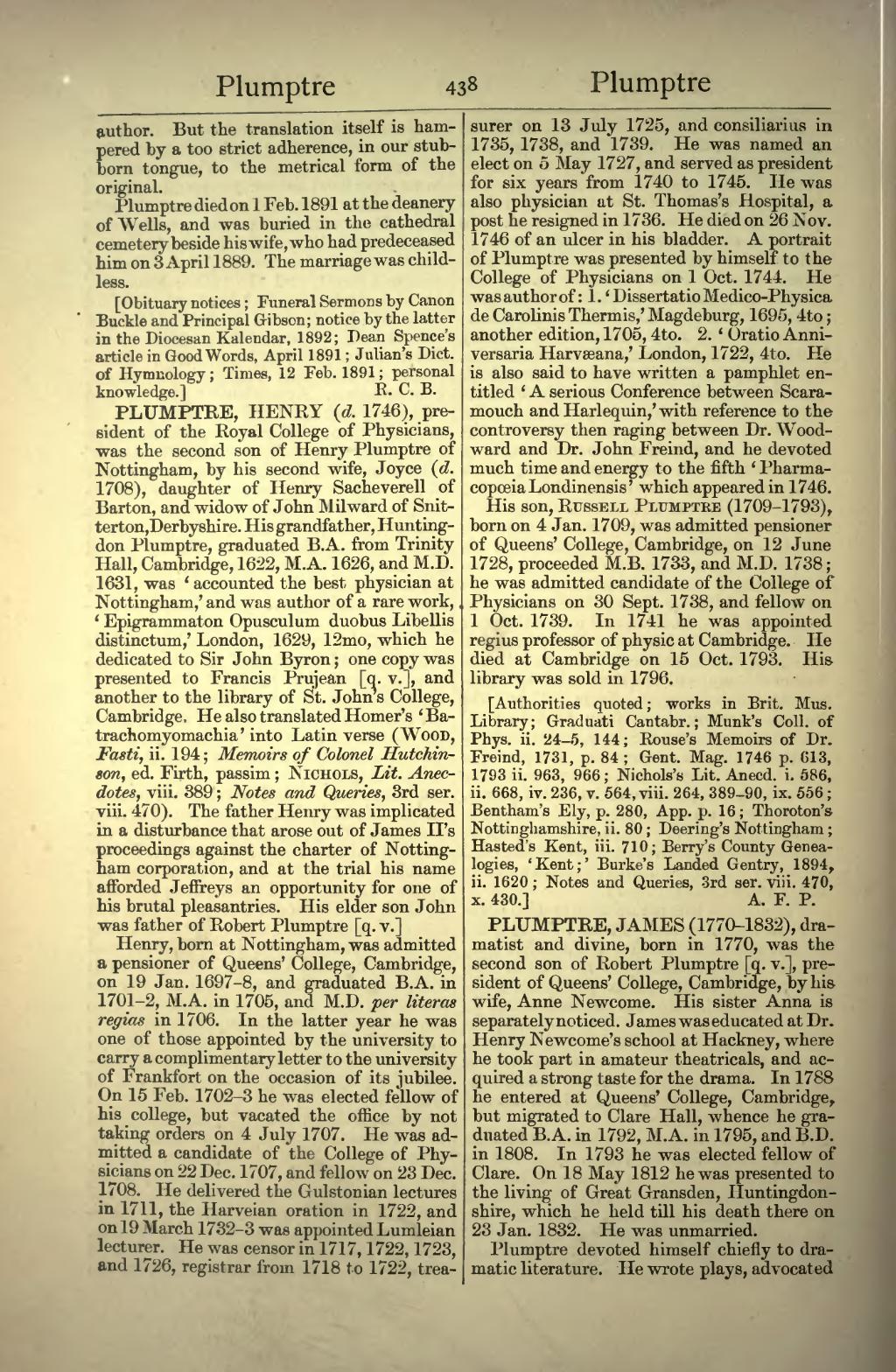author. But the translation itself is hampered by a too strict adherence, in our stubborn tongue, to the metrical form of the original.
Plumptre died on 1 Feb. 1891 at the deanery of Wells, and was buried in the cathedral cemetery beside his wife, who had predeceased him on 3 April 1889. The marriage was childless.
[Obituary notices; Funeral Sermons by Canon Buckle and Principal Gibson; notice by the latter in the Diocesan Kalendar, 1892; Dean Spence's article in Good Words, April 1891; Julian's Dict. of Hymnology; Times, 12 Feb. 1891; personal knowledge.]
PLUMPTRE, HENRY (d. 1746), president of the Royal College of Physicians, was the second son of Henry Plumptre of Nottingham, by his second wife, Joyce (d. 1708), daughter of Henry Sacheverell of Barton, and widow of John Milward of Snitterton, Derbyshire. His grandfather, Huntingdon Plumptre, graduated B.A. from Trinity Hall, Cambridge, 1622, M.A. 1626, and M.D. 1631, was ‘accounted the best physician at Nottingham,’ and was author of a rare work, ‘Epigrammaton Opusculum duobus Libellis distinctum,’ London, 1629, 12mo, which he dedicated to Sir John Byron; one copy was presented to Francis Prujean [q. v.], and another to the library of St. John's College, Cambridge. He also translated Homer's ‘Batrachomyomachia’ into Latin verse (Wood, Fasti, ii. 194; Memoirs of Colonel Hutchinson, ed. Firth, passim; Nichols, Lit. Anecdotes, viii. 389; Notes and Queries, 3rd ser. viii. 470). The father Henry was implicated in a disturbance that arose out of James II's proceedings against the charter of Nottingham corporation, and at the trial his name afforded Jeffreys an opportunity for one of his brutal pleasantries. His elder son John was father of Robert Plumptre [q. v.]
Henry, born at Nottingham, was admitted a pensioner of Queens' College, Cambridge, on 19 Jan. 1697–8, and graduated B.A. in 1701–2, M.A. in 1705, and M.D. per literas regias in 1706. In the latter year he was one of those appointed by the university to carry a complimentary letter to the university of Frankfort on the occasion of its jubilee. On 15 Feb. 1702–3 he was elected fellow of his college, but vacated the office by not taking orders on 4 July 1707. He was admitted a candidate of the College of Physicians on 22 Dec. 1707, and fellow on 23 Dec. 1708. He delivered the Gulstonian lectures in 1711, the Harveian oration in 1722, and on 19 March 1732–3 was appointed Lumleian lecturer. He was censor in 1717, 1722, 1723, and 1726, registrar from 1718 to 1722, treasurer on 13 July 1725, and consiliarius in 1735, 1738, and 1739. He was named an elect on 5 May 1727, and served as president for six years from 1740 to 1745. He was also physician at St. Thomas's Hospital, a post he resigned in 1736. He died on 26 Nov. 1746 of an ulcer in his bladder. A portrait of Plumptre was presented by himself to the College of Physicians on 1 Oct. 1744. He was author of:
- ‘Dissertatio Medico-Physica de Carolinis Thermis,’ Magdeburg, 1695, 4to; another edition, 1705, 4to.
- ‘Oratio Anniversaria Harvæana,’ London, 1722, 4to.
He is also said to have written a pamphlet entitled ‘A serious Conference between Scaramouch and Harlequin,’ with reference to the controversy then raging between Dr. Woodward and Dr. John Freind, and he devoted much time and energy to the fifth ‘Pharmacopœia Londinensis’ which appeared in 1746.
His son, Russell Plumptre (1709–1793), born on 4 Jan. 1709, was admitted pensioner of Queens' College, Cambridge, on 12 June 1728, proceeded M.B. 1733, and M.D. 1738; he was admitted candidate of the College of Physicians on 30 Sept. 1738, and fellow on 1 Oct. 1739. In 1741 he was appointed regius professor of physic at Cambridge. He died at Cambridge on 15 Oct. 1793. His library was sold in 1796 (Mason's Gray, 1827, p. 328).
[Authorities quoted; works in Brit. Mus. Library; Graduati Cantabr.; Munk's Coll. of Phys. ii. 24–5, 144; Rouse's Memoirs of Dr. Freind, 1731, p. 84; Gent. Mag. 1746 p. 613, 1793 ii. 963, 966; Nichols's Lit. Anecd. i. 586, ii. 668, iv. 236, v. 564; viii. 264, 389–90, ix. 556; Bentham's Ely, p. 280, App. p. 16; Thoroton's Nottinghamshire, ii. 80; Deering's Nottingham; Hasted's Kent, iii. 710; Berry's County Genealogies, ‘Kent;’ Burke's Landed Gentry, 1894, ii. 1620; Notes and Queries, 3rd ser. viii. 470, x. 430.]
PLUMPTRE, JAMES (1770–1832), dramatist and divine, born in 1770, was the second son of Robert Plumptre [q. v.], president of Queens' College, Cambridge, by his wife, Anne Newcome. His sister Anna is separately noticed. James was educated at Dr. Henry Newcome's school at Hackney, where he took part in amateur theatricals, and acquired a strong taste for the drama. In 1788 he entered at Queens' College, Cambridge, but migrated to Clare Hall, whence he graduated B.A. in 1792, M.A. in 1795, and B.D. in 1808. In 1793 he was elected fellow of Clare. On 18 May 1812 he was presented to the living of Great Gransden, Huntingdonshire, which he held till his death there on 23 Jan. 1832. He was unmarried.
Plumptre devoted himself chiefly to dramatic literature. He wrote plays, advocated
